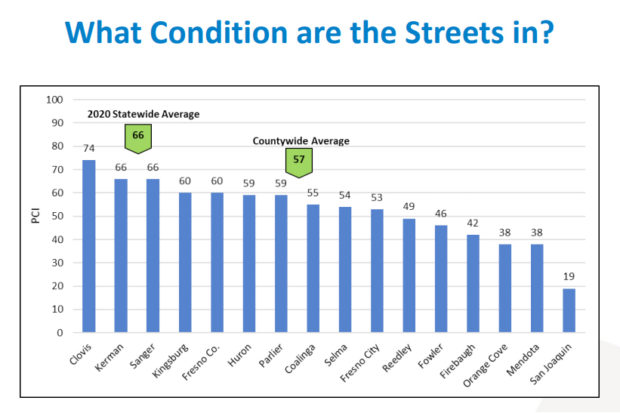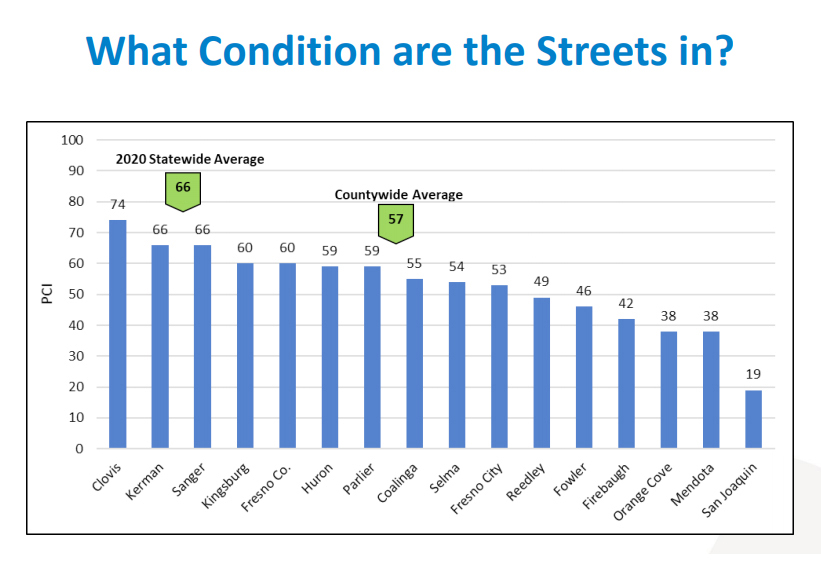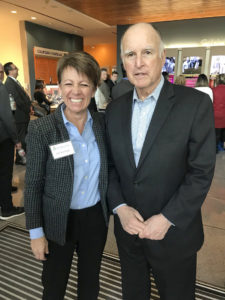
Nonprofit organizations in and around Fresno will soon be receiving generous offers of grant money to conduct outreach in neighborhoods and small communities where average income is low, pollution levels high and public investment scarce.
The funding application form will be infused with keywords such as equity, transit, seniors, road repair, bike trails, clean air and jobs, jobs, jobs. The funders will even throw in climate change for once.
Labor unions, leading Democrats and the heads of reputable institutions will be on board, calling Measure C—that’s our 34-year-old countywide half-cent retail sales tax dedicated to subsidizing developer sprawl—the key to a sustainable, prosperous future. Across the aisle, Fresno Mayor Jerry Dyer, Fresno County Supervisor Buddy Mendes and a long list of developers will be pushing a parallel message promising road repair and safer rural highways.
And they will be mostly lying. They can be stopped, but it’s going to be a challenge for community advocates to know right from wrong, truth from deception.
Through a long-term planning document known as the Regional Transportation Plan, the bulk of the money has been theoretically earmarked for even more paved pipelines of White flight to north Fresno, Clovis and the foothill communities out eastbound Highways 168 and 180, and for industrial developers planning to inundate south Fresno in diesel exhaust along Highways 99 and 41. They’re even investing in Madera County road planning. Those are the projects that have always eaten up most of the money and will continue to do so unless nonprofit outreach organizations refuse to play.
The costs of big road projects—hundreds of millions into Assemiland’s Veterans Boulevard area, for example—are hidden behind promises of the projects and outcomes that most voters want: road repair, safer highways, sidewalks, electric vehicles, expanded transit and paratransit, bike lanes and trails, clean air and a stable climate. It’s greenwashing of the worst sort by the twin road-building machines, the highly politicized Fresno County Transportation Authority (FCTA) and the Fresno Council of Governments (COG).

In a coordinated effort to jam through a renewal of Measure C, these powerful agencies have allocated a cool million in taxpayer dollars for public “outreach.” The false promise being made by the staff of the COG, the FCTA and their bastard offspring, the Measure C Renewal Executive Committee, is that the outreach will yield information that might significantly alter the sales tax expenditure plan.
In truth, the outreach is a persuasion campaign; the only useful information will be anything that informs their campaign strategy to pass the tax in 2022. You see, the ballot language has already been written and was presented to the committee more than two months ago, though more than half were absent or yet to be appointed:
“To create local jobs; keep local roads/transportation infrastructure in good condition; repair potholes; reduce traffic congestion; improve highway/freeway safety, 911 emergency vehicle access, air quality, public transit services; protect low-cost senior transportation options; shall an ordinance be adopted to continue the voter approved transportation ½¢ sales tax, established 1986, without a tax increase, providing approximately $84,000,000 annually until ended by voters; requiring audits, citizens’ oversight, with local control?”
Grantees will be asked to spread those falsehoods and more while working for these transportation agencies shown to be rife with systemic racism and exclusionary practices through the recent committee selection process (see related story). But the public will be promised that their input will inform the spending plan and its priorities.
The truth is also found in the Jan. 19, 2021, committee recruitment letter, obtained through a Public Records Act request, from FCTA head staffer Mike Leonardo to Economic Development CEO Lee Ann Eager. “For 2022, we don’t see a major shift in the expenditure plan,” he wrote. Uh oh. By 2022, he means to be voted on next year; oh, and by the way, it would last forever; the expenditure plan in place today would remain the same with no fixed return date to voters, no sunset clause. As the paragraph above states, with an intent to deceive through its false promise of more control: “until ended by voters.” How do they do that without a sunset clause?
The priorities shaping the expenditure plan were set in freeway concrete nearly 40 years ago when the first Measure C won voter approval, and Eager, Leonardo and a haphazard collection of community “leaders” agree nothing needs to change? Yikes!
However, if you’re under the age of 50, then you’ll want to know about all the people over 50 who are planning your future post 2050. They won’t be alive by then but they’ve got it all figured out for you and say they know how to best design the transportation system needed by Fresno County residents in a world shaped by climate change and ecological collapse.
In fact, they’re so confident in their knowledge that in their first voter survey they asked no questions about electrification or electric vehicles, nor did they ask a single one about climate change. They also want the tax to never come back to voters, so they’re removing the 20-year sunset clause. And we’re in their hands.
The 22-member committee has met three times this year and attendance has been weak and getting worse, dropping from 17 in February to 16 in May to 13 in July; maybe 10 members have made all three meetings. As a whole, the committee has an average absentee rate of 30% with a peak of 41% last month. So who are they?
In the coming months, “Climate Politics” will present profiles of these heroic champions of a sustainable future, beginning with Eager.
You’re encouraged to join the critically important Measure C meetings. Visit www.measurec.com for details under the Measure C Renewal tab or contact Leslie Martinez at Leadership Counsel for Justice and Accountability (559-369-2790, lmartinez@leadershipcounsel.org) to join in the organized campaign for equity in transportation spending.
How Do They “C” Your Future?
As president and CEO of the Fresno County Economic Development Corporation (EDC), Lee Ann Eager is an accomplished public employee who earns above $200,000 a year annually, according to NonProfit Light. Eager serves on the California Transportation Commission, appointed by Govenor Newsom, and she’s on the countywide, privately selected Measure C Renewal Executive Committee, chosen by staff.
From her north Fresno neighborhood above River Park, Eager, a registered Democrat, enjoys an 11-mile, 17-minute commute on Highway 41 to the EDC’s downtown office; she must know its northbound five-lane off-ramp at Friant Road all too well.

The heavily canopied neighborhood is complete with bike trail access to the San Joaquin River Parkway, 300-acre Woodward Park and a palatial, taxpayer-funded library. In short, it’s what’s known as a “complete neighborhood.” And it’s been fully subsidized by taxes on the poor.
As for her record on transportation and public health, Community Alliance readers might recall Eager from an article published in the April 2018 issue, “Tectonic Forces Converge: Walls of Institutional Racism Sway at City Hall.” She was then urging the Fresno City Council to ignore the California Environmental Quality Act and approve more than 2 million square feet of warehouse space and 6,000 new vehicle trips per day for State Center Community College District Trustee Richard Caglia; he just so happens to sit as an at-large director on her executive committee at the EDC.
“We are the fifth largest city in the sixth largest economy in the world, and we have to act like it,” Eager told the Fresno City Council back in 2018 in support of Caglia and against protective public health measures. Again, she was demanding they ignore state law, a violation so flagrant in this case that the state attorney general’s office joined a lawsuit brought by South-Central Neighbors United and Leadership Counsel for Justice and Accountability—which they won!
Eager was dead wrong, but she wasn’t alone then and she’s not alone now. Next month’s profile in 21st century planning from the hive mind of 1986: Mark Keppler, executive director of the Maddy Institute.
